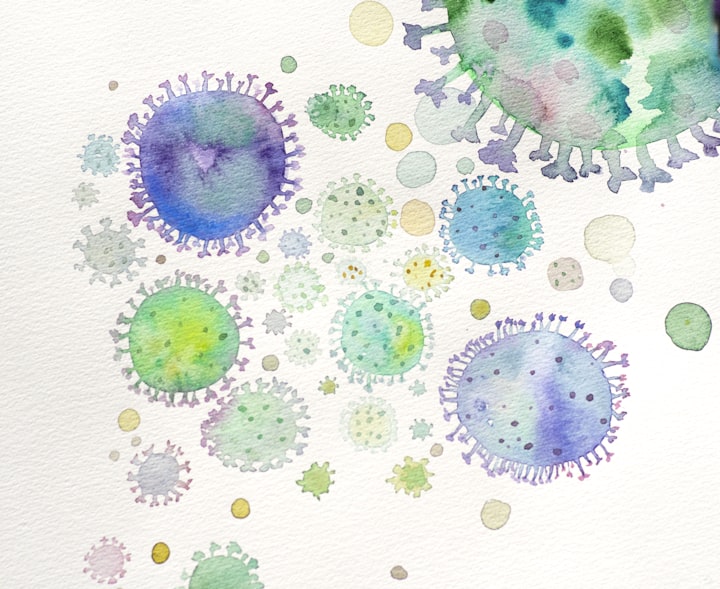There's Anywhere from 2-9 Pounds of Bacteria in the Body at Any Given Time
Here's why these pounds aren't the ones you'd want to shave off in your next diet.

Bacteria has a bad reputation for being the cause of diseases and illnesses. However, did you know that your body has anywhere from 2-9 pounds of bacteria at any given time? Bacteria is actually necessary for protection and metabolic purposes. So, even though some bacteria does cause problems and sickness, others are actually good for you!
What is good bacteria?
All of the bacteria that lives in your body is a part of your microbiome. The microbiome is the entire collection of bacteria in your body. Your skin, stomach, reproductive structures are some of the main areas with good bacteria. These are species that help with a few functions. In your reproductive tract, for example, good bacteria can outnumber bad bacteria, keeping them from proliferating.
As an illustration, when women get yeast infections, it’s not because a new type of bacteria got inside of them somehow. Women always have yeast inside of their vaginas, yet the yeast is well controlled and only in a specific quantity. It helps to maintain the overall health of the vagina. However, when the pH changes due to a number of causes, this yeast grows to a tremendous amount that is the cause of irritation and discharge. Antibiotics and suppositories help to regulate this activity and return the amount of yeast back to their normal numbers.
How antibiotics harm good bacteria
However, antibiotics are not selective and can kill off good bacteria in your digestive tract. Your small and large intestines are lined with trillions of bacteria. Some are bad for you, but most of them help you to digest your food. When you take antibiotics for bad bacteria in another region of your body, then that can kill off some of this good bacteria, especially in your gut. When the good bacteria is killed off, it no longer overpowers negative bacteria, allowing it to flourish and cause digestive issues; diarrhea, upset stomach, vomiting, and indigestion.
The opposite can be true as well. If you have a bacterial infection in your lungs or stomach, then taking antibiotics can actually cause a yeast infection. The main point is that good bacteria is very important for maintaining homeostasis in our bodies.
What is bad bacteria?
Bad bacteria are the species in our bodies that can cause illness and disease. Some of these are streptococcus, enterobacteria, pneumoniae, and several other bugs with very strange names. Many of these bacteria already reside in our bodies. For example there is a bacteria that resides in our mouth and serves a purpose of assisting with food breakdown. However, in microaspirations - where tiny droplets escape the mouth and make their way to lungs - this bacteria spreads to the very sensitive land of lung tissue. In the lungs, they can cause very serious tissue inflammation and disease, even though they reside in the mouth just fine with no issues.
Bad bacteria is also responsible for diseases like pneumonia and strep throat, or laryngitis. Some of these bugs are outside invaders, but many of them are the result of friendly fire. The body tries really hard to fight off these infections, however, even our bodies do not have perfect aim. In their attempt at removing the infectious agents, they wreak havoc on normal body tissues. This is why when you’re sick you feel terrible. Your body raises it’s temperature in an attempt to make an unsuitable environment for the bacteria and has employed all defense mechanisms. So, as your immune system takes out the bacteria, you may also notice inflammation, swelling, itching, runny nose, etc., all because your body is trying to rid itself of the invader.
This crash course on immunology can be a little overwhelming, but it’s so fascinating to see all of the tools built into our bodies to help protect us from all the dangers in the world that try to make us sick.

Where else is bacteria in my body?
Another place where you can find a huge community of bacteria is on the skin. The skin is the largest organ on the body, covering every external surface. It’s purpose is to create a barrier between the outside world and our very temperamental insides. Aiding in this job is the skin microbiome.
Many of these bacteria are harmless, or have a neutral symbiotic relationship with our skin. It hangs out and doesn’t harm us or benefit from us while our body doesn’t harm or benefit from it. The other two types of relationship between the skin microbiome and us is commensalism and mutualism. Commensalism is when one benefits while the other is neither harmed nor benefits. This relationship can apply in either direction, although most likely we would benefit while they would just be. Mutualism is when both benefit. For example, the bacteria gets energy from consuming something that would otherwise hurt us. There is also a parasitic relationship that can happen, but that would be the result of the good bacteria being overwhelmed by bad or a foreign invader.
Pretty much every opening to the outside world also has bacteria. Nose, eyes, ears, mouth, and any invaginations (i.e. hair pores and sweat glands) will have their own microbiota. These microbiota consist of both positive and negative bacteria that live in a type of harmony to keep us healthy. When this balance is out of whack, yep you guessed it, we get sick. Also, if any of these bacteria go to a region they aren’t supposed to, you guessed it again, we get sick.
The Invisible Weight
Although these bacteria weigh very little individually, collectively, they can be the source of 2-6 pounds in a 200 pound individual. We can’t see these creatures, but they are everywhere on our body and necessary for keeping us healthy. Even though bacteria has a negative reputation, we actually need it. If you’re ever sick and have extreme digestive troubles or have to take antibiotics, make sure to eat yogurt or take probiotics to replace those good little helpers.
About the Creator
James Porterson
Former obese teen turned nutritionist. Enjoys writing about staying active and proper nutrition.






Comments
There are no comments for this story
Be the first to respond and start the conversation.